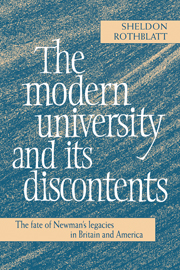Book contents
- Frontmatter
- Contents
- Preface
- 1 The idea of the idea of a university and its antithesis
- 2 ‘Consult the Genius of the Place’
- 3 ‘The first undergraduates, recognizable as such’
- 4 Failure
- 5 Historical and comparative remarks on the ‘federal principle’ in higher education
- Interlude: General introduction to Chapters six and seven
- 6 Supply and demand in the writing of university history since about 1790: 1. ‘The awkward interval’
- 7 Supply and demand in the writing of university history since about 1790: 2. The market and the University of London
- 8 Alternatives: 1. The importance of being unattached
- 9 Alternatives: 2. Born to have no rest
- Index
1 - The idea of the idea of a university and its antithesis
Published online by Cambridge University Press: 02 December 2009
- Frontmatter
- Contents
- Preface
- 1 The idea of the idea of a university and its antithesis
- 2 ‘Consult the Genius of the Place’
- 3 ‘The first undergraduates, recognizable as such’
- 4 Failure
- 5 Historical and comparative remarks on the ‘federal principle’ in higher education
- Interlude: General introduction to Chapters six and seven
- 6 Supply and demand in the writing of university history since about 1790: 1. ‘The awkward interval’
- 7 Supply and demand in the writing of university history since about 1790: 2. The market and the University of London
- 8 Alternatives: 1. The importance of being unattached
- 9 Alternatives: 2. Born to have no rest
- Index
Summary
INTRODUCTION: IDEAS OF A UNIVERSITY
The subject of this chapter is the history of the ‘idea of a university’, or rather, it is the history of the idea that a university derives its identity from an idea. The subject is puzzling. Why does a university require an ‘idea’? Quite simply, it does not. The historical answer, however, is more interesting. Whether or not a university needs an ‘idea’, it has been assigned one, more than one, in fact. For two centuries a particular kind of debate has gone on, revived in every generation, concerning the role and purpose of a university and the education it provides. The debate has been inconclusive. Yet what is significant about the history of the idea of a university is the search for one, the striving after an ideal that must satisfy two conditions: it must be pure, like a platonic ideal, and it must be lasting, superior to all apparent transformations.
By ‘idea’, then, is meant an inherent purpose, embedded, as it were, into the university and possibly its history – but this is not always clear from debate. An ‘idea’ is also a genetic code that dictates the subsequent development of a university; but like all such inheritances, the signals are not always recognised.
Metaphors such as these come readily to mind, for the history of the idea of the idea of a university lacks precision.
- Type
- Chapter
- Information
- The Modern University and its DiscontentsThe Fate of Newman's Legacies in Britain and America, pp. 1 - 49Publisher: Cambridge University PressPrint publication year: 1997
- 4
- Cited by



